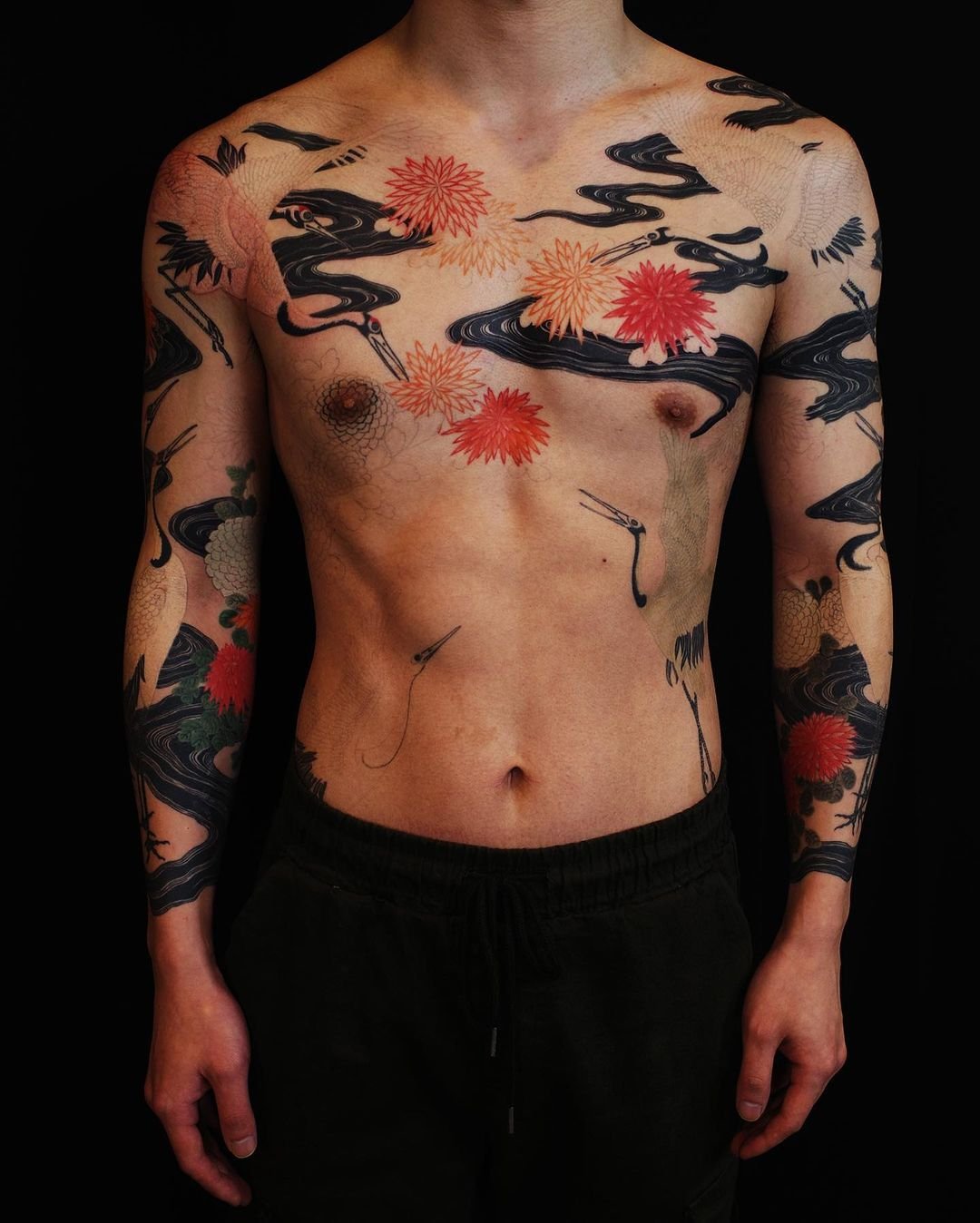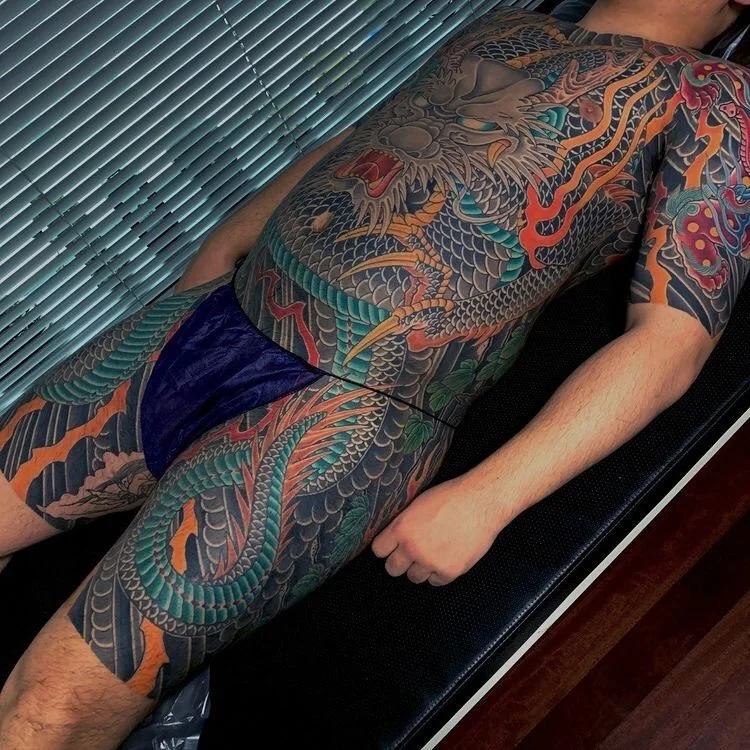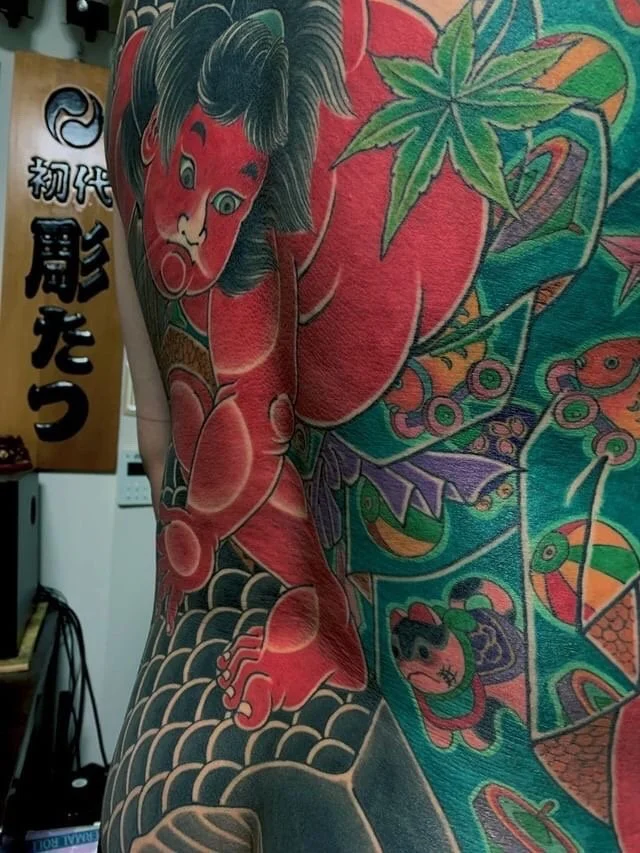The legal quandary of Korea's tattoo culture.
Written by Taylor Bond
There's a surprising thread that links 4th-century coastal Korean fisherman, Joseon-era criminals, modern-day K-pop superstars, and countercultural movements; tattoos.
Tattoos have a colourful history in Korea. They've been used as a sign of protection, used to brand people as property, and also viewed as a disgraceful marring of the skin. And yet, despite these pervasive negative preconceptions, tattoos are becoming a common sight to see scattered throughout the trendiest streets, comfortably mixed in-between hair rollers, office uniforms, and the latest fashion styles.
Korean society's conservative views on tattoos originate centuries ago, from the Joseon Dynasty. In this era of Korean history, enslaved people were branded with the class and status of their owners. Criminals were inked with a visual record of their crimes. Tattoos, in their very practice, existed as a division of social class that could be verified through a single glance. Still today, the association between tattoos and criminal activity lingers. The Yakuza style of head to toe ink in bold colours and graphics has now become a signifier of Korean gangs, too.
However, the Korean peninsula's multifaceted relationship with tattoos extends beyond the Joseon era to the Samhan period. From around 200 BCE to the reign of the Three Kings, tattoos were treated as a corporal talisman. They were a symbol of protection etched upon the body. It was believed that hazardous sea voyages or the unknown dangers of everyday life could be warded against by embedded ink. While this practice was most commonly found among southern fishermen and divers, ink was viewed favourably across the different Samhan tribal confederacies.
“Getting a tattoo in Korea is not just an commitment to art, but an act of rebellion”
One of Seoul's premier tattoo artists, Moon Cheon, produces intricately detailed tattoos that replicate traditional Korean art. Crouching tigers with faces captured mid-snarl. Staccato chrysanthemum flowers blossoming on open expanses of skin. Sweeping Korean mountain ranges and vivid blue rivers flowing like a map across the shoulder, back, and arms. Each of Moon's tattoos could be easily mistaken for replicas of art displayed in the National Museum of Korea. His 182,000 (and counting) Instagram followers certainly agree.
In regards to his artistic style, Moon explains, "I find inspiration for my art in everyday life, landscapes, plants, and animals. But I try to capture these images in the minwha Korean folkstyle because it was an art form meant for everyone, not just a special class of people.”
Despite the sheer artistry that each of his tattoos embody, Moon concedes that life in Korea can be difficult for someone who visibly embraces tattoo culture. "It hasn't been easy having tattoos in Korea. When I'm on the subway, people judge me and tend to think I'm a bad guy. Even now, there's still a lot of prejudice and misunderstanding, but more and more people recognise me as a true artist these days."
He was initially hesitant to pursue tattooing as an art form. "I was always interested in tattoos and tattoo culture, but I didn't have the courage to become a non-mainstream artist." However, his feelings shifted drastically after completing an apprenticeship with a Korean tattooist and seeing the transformation from plain skin to a tapestry of ink firsthand. Moon describes his former teacher as "creative and free. He paints on people's bodies with his own point of view. I felt that what he created wasn't just work, but that it was truly art." Since then, Moon has completed residencies worldwide and designed on the human canvas with his own creative perspective.
Throughout Korea, Tattooists have similar stories to share when discovering their fascination for the art form - a gripping sense of freedom and artistry that feels undeniable. Kyungjin, who runs FatBuddha Studio, is often described as one of the premier tattoo artists in Busan, or even in all of Korea. He has been a staple of the tattoo industry for over 37 years.
Kyungjin's foray into tattooing began after watching a Japanese Yakuza B-movie film. "When I first saw the full-body tattoo, I was deeply moved and shocked. I didn't even think about tattooing as a job. I just wanted someone to engrave that on my body someday too. "
Compared to Moon, who features minwha motifs in his tattoo style, Kyungjin heavily embraces the full-body Japanese style of tattoos associated with the Yakuza. Customers are just as likely to request work of the seven lucky gods stretching from neck to foot as they are to have half-sleeve falcons hidden among black-and-white foliage. But Kyungjin’s work has one factor that remains consistent—designs that never shy away from size. Kyungjin also shows no interest in scaling himself down to fit in with conservative values.
"Of course, there will always be people who develop a prejudice against tattoos because the act of stabbing and transforming a part of the body while it bleeds feels primitive to some. But I don't want to waste time even thinking about those people. "Instead, Kyungjin lives his life pursuing his passions freely, without concern for others and potential negative views of tattooing. As he says, becoming a tattoo artist was "the happiest thing I've ever done."
In Korean law, tattoos are not technically illegal; however, they are viewed as a medical procedure only to be completed by an accredited medical professional. Surveys found, however, that only 0.6% of people received their tattoos from a licensed doctor. The rest got inked from one of the many modern tattoo studios that hide in plain view throughout Korea.
Trendy, youth-centric locations feature the highest concentration of these illicit studios. Meccas of pop-culture like Hongdae, Seongsu, and Itaewon are home to an ever-increasing number of tattoo parlours. These backdoor studios operate in clandestine locations, tucked away above convenience stores or hidden next to antique furniture alleyways. They obscure themselves with opaque curtains blocking the windows, a thinly-veiled act of secrecy. Customers book appointments via Instagram, where artists can reach worldwide fame while working in a legal grey area in their home country.
Kodzunak, the studio where Moon and a handful of other tattoo artists operate, is heavily frequented by international customers. They have experienced their share of issues dealing with Korean law. "Even though the public perception has shifted, the legal one hasn't," Moon explains. "If someone reports us and the police come rushing to our studio, there's no way to protect ourselves legally. Or, if someone changes their mind after a tattoo and demands compensation for excessive laser removal treatment, that's not something we can fight."
It's not just potential mistreatment from disgruntled customers or police tip-offs that worries Moon, and the other artists at his studio. "It's also dangerous for us. If an artist gets sexually harassed or assaulted at the workplace, they can't make a report to the police because they were working as 'illegal tattooists."
Many see opposition to tattoos as a throwback to Confucian ideals, where any modifications made to the body are seen as desecrating what your parents bestowed on you at birth. South Korea, however, has one of the highest rates of plastic surgery in the world, and in many ways, body modifications have been completely normalised. Despite the extreme prevalence of jaw-thinning and double-eyelid procedures, which the government often promotes overseas as a form of medical tourism, tattoos alone remain an act of rebellion.
But not for everyone.
Both Moon and Kyungjin describe the incredible demand from customers in their 20s and 30s. Kyungjin admits, "there's a big difference in perception of tattoos between generations." He further explains that customers now have "established themselves in their own culture where they can accept others freely and express themselves confidently."
Many people living in modern-day Korea already spend their life navigating between constricting traditional values and trailblazing their own paths of self-expression. More and more are embracing the things that interest them rather than what society deems acceptable. Whether it's the clothes they wear, the music they like, or the art they decide to display proudly on their skin.
Korean superstars such as R&B rapper Jay Park or BTS musician Jungkook are now proudly performing both global and domestic concerts with their tattoos on full view. Perhaps a shift in the perception of Korean tattoo culture from something relegated to purely counterculture to some liminal space that's almost mainstream is inevitable.
The unique legal quandary of Korea's tattoo market makes it a singularly risky act. It is also a personal and creative expression of one's identity. In that way, it is not just an act of rebellion but an act of art.
For more information on Moon Cheon, follow here.
For more information on Kyungjin, follow here.







